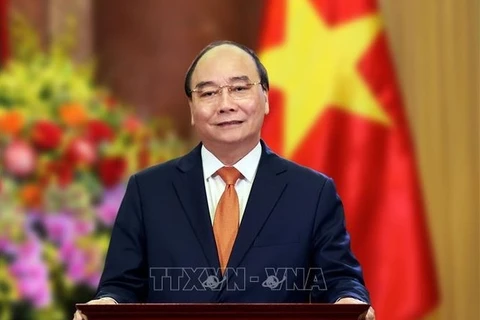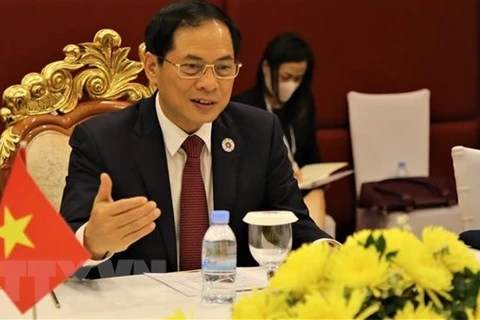Hanoi (VNA) – Thailand, the APEC 2022 Chair, is showing close coordination with other countries in Southeast Asia to promote the region’s post-pandemic economic recovery, while proposing initiatives to foster the regional economic recovery, according to Thai Ambassador to Vietnam Nikorndej Balankura.
The Thai diplomat made the statement in an interview granted to the Vietnam News Agency on the occasion of major international conferences hosted by regional countries, including the 40th and 41st ASEAN Summits and Related Meetings (in Cambodia from November 10-13), the G20 Summit (in Indonesia from November 15-16), and the APEC Economic Leaders' Meeting (in Thailand from November 18-19).
Following is the full text of the interview:
Reporter: This year, Cambodia, Indonesia and Thailand are hosting major international conferences. Could you tell me the coordination between Thailand, as the APEC 2022 Chair; Indonesia, as the G20 President; and Cambodia, as the ASEAN Chair, to promote the region’s post-pandemic economic recovery?
Ambassador Nikorndej Balankura: First of all, it is certainly heartening that three Southeast Asian nations are hosting these major international conferences during the same time, and in-person. It is an outstanding reflection on how our region has handled the pandemic, as well as the effectiveness of our efforts toward post-COVID recovery.
In terms of coordination between Thailand, Indonesia, and Cambodia, to promote the region’s post-pandemic economic recovery, this common direction is not necessarily intentional but also not a coincidence. It is indicative of the shared outlook of all three countries, and the world, that we need to move forward together toward the ‘next normal’, where public health and human security, regional and global economic integration, and prosperity that is driven by sustainability and balance are prioritised.
If you look at the themes for each conference, you will see that they all share these common values, though may place emphasis on different things, depending on regional interests and contexts. For instance, Thailand’s theme for APEC 2022, is “Open. Connect. Balance,” led by the Bio-Circular-Green (BCG) Economy Model, which aims to facilitate open trade and investment, restore connectivity through safe and seamless cross-border travel and increase health security investment for further business mobility, and integrate inclusivity and sustainability objectives into economic goals to create balance and resilience.
Reporter: What are the initiatives and proposals made by Thailand to realise ASEAN's 2022 chairmanship theme of “ASEAN A.C.T.: Addressing Challenges Together” in the spirit of solidarity for shared prosperity? What should ASEAN do to promote ASEAN centrality in regional connectivity?
Ambassador Nikorndej Balankura: Thailand believes that to realise the theme of “ASEAN A.C.T.: Addressing Challenges Together”, it is essential to drive forward a strong ASEAN Community, which can be done in three ways. First, ASEAN member states must strengthen today’s foundations through the effective implementation of the ASEAN Comprehensive Recovery Framework, especially when it comes to public health and human security promotion.
Thailand stands ready to contribute meaningfully to this end, as host of the ASEAN Centre for Public Health Emergencies and Emerging Diseases (ACPHEED) Secretariat Office and Response Office. ASEAN must also accelerate the deepening of regional economic integration and strengthen economic relations with its partners.
Second, ASEAN must work together for tomorrow, prioritising sustainability in all of ASEAN’s strategies, including in its ASEAN Community Vision Post-2025. Third is the respect for the ASEAN Way.
The key principles of cooperation, consultation, and consensus within ASEAN must be adhered to, in order to drive forward the ASEAN Community, foster ASEAN centrality, and shield ASEAN against outside intervention.
Reporter: Thailand has been promoting the Bio-Circular-Green (BCG) Economy strategy. How would the concept be introduced to the upcoming ASEAN conferences to increase business opportunities after the COVID-19 pandemic?
Ambassador Nikorndej Balankura: The Bio-Circular-Green (BCG) Economy Model integrates bioeconomy, circular economy, and green economy to form a more holistic and balanced approach to advancing economic, environmental, and social goals. At its core, the BCG Economy Model promotes a shift in behaviour toward a “balance of all things” so that we may grow and prosper while emphasising balance and sustainability over profit-maximisation.
This is a concept that Thailand has already introduced to ASEAN as we believe that sustainability must be integrated into all aspects of ASEAN’s work. Science, technology, and innovation are key in the application of the BCG Economy Model and therefore, may lead to many business opportunities, especially in e-commerce and digital economy.
Reporter: How do you think about Vietnam’s engagement in and contributions to building an equal, strong and inclusive ASEAN community for harmony, peace and prosperity in the region?
Ambassador Nikorndej Balankura: Vietnam has always made meaningful contributions to building an equal, strong, and inclusive ASEAN community for harmony, peace, and prosperity in the region.
During Vietnam’s ASEAN Chairmanship in 2020, under the theme of “Cohesive and Responsive”, Vietnam emphasised the importance of ASEAN solidarity and centrality, strong and constructive engagement with ASEAN partners, and strengthening connectivity, whether in terms of economic integration through the signing of the Regional Comprehensive Economic Partnership (RCEP) or building and enhancing ASEAN mechanisms to be more proactive, especially when facing regional and global challenges.
These are stances that Vietnam still places at the forefront of its vision for ASEAN, which points to Vietnam’s consistency and dedication toward a prosperous ASEAN Community for our region.
Reporter: Thank you very much!./.
The Thai diplomat made the statement in an interview granted to the Vietnam News Agency on the occasion of major international conferences hosted by regional countries, including the 40th and 41st ASEAN Summits and Related Meetings (in Cambodia from November 10-13), the G20 Summit (in Indonesia from November 15-16), and the APEC Economic Leaders' Meeting (in Thailand from November 18-19).
Following is the full text of the interview:
Reporter: This year, Cambodia, Indonesia and Thailand are hosting major international conferences. Could you tell me the coordination between Thailand, as the APEC 2022 Chair; Indonesia, as the G20 President; and Cambodia, as the ASEAN Chair, to promote the region’s post-pandemic economic recovery?
Ambassador Nikorndej Balankura: First of all, it is certainly heartening that three Southeast Asian nations are hosting these major international conferences during the same time, and in-person. It is an outstanding reflection on how our region has handled the pandemic, as well as the effectiveness of our efforts toward post-COVID recovery.
In terms of coordination between Thailand, Indonesia, and Cambodia, to promote the region’s post-pandemic economic recovery, this common direction is not necessarily intentional but also not a coincidence. It is indicative of the shared outlook of all three countries, and the world, that we need to move forward together toward the ‘next normal’, where public health and human security, regional and global economic integration, and prosperity that is driven by sustainability and balance are prioritised.
If you look at the themes for each conference, you will see that they all share these common values, though may place emphasis on different things, depending on regional interests and contexts. For instance, Thailand’s theme for APEC 2022, is “Open. Connect. Balance,” led by the Bio-Circular-Green (BCG) Economy Model, which aims to facilitate open trade and investment, restore connectivity through safe and seamless cross-border travel and increase health security investment for further business mobility, and integrate inclusivity and sustainability objectives into economic goals to create balance and resilience.
Reporter: What are the initiatives and proposals made by Thailand to realise ASEAN's 2022 chairmanship theme of “ASEAN A.C.T.: Addressing Challenges Together” in the spirit of solidarity for shared prosperity? What should ASEAN do to promote ASEAN centrality in regional connectivity?
Ambassador Nikorndej Balankura: Thailand believes that to realise the theme of “ASEAN A.C.T.: Addressing Challenges Together”, it is essential to drive forward a strong ASEAN Community, which can be done in three ways. First, ASEAN member states must strengthen today’s foundations through the effective implementation of the ASEAN Comprehensive Recovery Framework, especially when it comes to public health and human security promotion.
Thailand stands ready to contribute meaningfully to this end, as host of the ASEAN Centre for Public Health Emergencies and Emerging Diseases (ACPHEED) Secretariat Office and Response Office. ASEAN must also accelerate the deepening of regional economic integration and strengthen economic relations with its partners.
Second, ASEAN must work together for tomorrow, prioritising sustainability in all of ASEAN’s strategies, including in its ASEAN Community Vision Post-2025. Third is the respect for the ASEAN Way.
The key principles of cooperation, consultation, and consensus within ASEAN must be adhered to, in order to drive forward the ASEAN Community, foster ASEAN centrality, and shield ASEAN against outside intervention.
Reporter: Thailand has been promoting the Bio-Circular-Green (BCG) Economy strategy. How would the concept be introduced to the upcoming ASEAN conferences to increase business opportunities after the COVID-19 pandemic?
Ambassador Nikorndej Balankura: The Bio-Circular-Green (BCG) Economy Model integrates bioeconomy, circular economy, and green economy to form a more holistic and balanced approach to advancing economic, environmental, and social goals. At its core, the BCG Economy Model promotes a shift in behaviour toward a “balance of all things” so that we may grow and prosper while emphasising balance and sustainability over profit-maximisation.
This is a concept that Thailand has already introduced to ASEAN as we believe that sustainability must be integrated into all aspects of ASEAN’s work. Science, technology, and innovation are key in the application of the BCG Economy Model and therefore, may lead to many business opportunities, especially in e-commerce and digital economy.
Reporter: How do you think about Vietnam’s engagement in and contributions to building an equal, strong and inclusive ASEAN community for harmony, peace and prosperity in the region?
Ambassador Nikorndej Balankura: Vietnam has always made meaningful contributions to building an equal, strong, and inclusive ASEAN community for harmony, peace, and prosperity in the region.
During Vietnam’s ASEAN Chairmanship in 2020, under the theme of “Cohesive and Responsive”, Vietnam emphasised the importance of ASEAN solidarity and centrality, strong and constructive engagement with ASEAN partners, and strengthening connectivity, whether in terms of economic integration through the signing of the Regional Comprehensive Economic Partnership (RCEP) or building and enhancing ASEAN mechanisms to be more proactive, especially when facing regional and global challenges.
These are stances that Vietnam still places at the forefront of its vision for ASEAN, which points to Vietnam’s consistency and dedication toward a prosperous ASEAN Community for our region.
Reporter: Thank you very much!./.
VNA
























